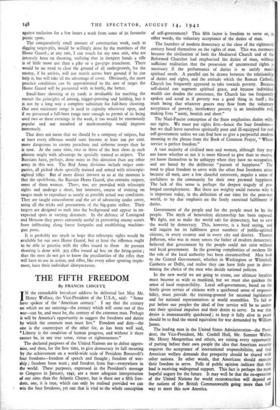THE FIFTH FREEDOM
By FRANCIS LIDGET1
IN the remarkable broadcast address he delivered last May Mr. Henry Wallace, the Vice-President of the U.S.A., said: " Some have spoken of the ' American century.' I say that the century on which we are entering—the century which will come out of this war—can be, and must be, the century of the common man. Perhaps it will be America's opportunity to suggest the freedoms and duties by which the common man must live." Freedom and duty—the one is the counterpart of the other for, as has been well said, "Liberty is the condition of human progress, and without it there cannot be, in any true sense, virtue or righteousness."
The declared purposes of the United Nations are to defeat aggres- sion, and then, for the first tithe, to give democracy its full meaning by the achievement on a world-wide scale of President Roosevelt's four freedoms—freedom of speech and thought ; freedom of wor- ship ; freedom from want ; and freedom from fear—everywhere in the world. These purposes, expressed in the President's message to Congress in January, 1941, are a more adequate interpretation of our aims than the Atlantic Charter, but is there not a fifth free- dom, one, it is true, which can only be realised provided we can win the four freedoms, yet one that is vital to the whole conception
of self-government? This fifth factor is freedom to serve or, in other words, the voluntary acceptance of the duties of man.
The founders of modern democracy at the close of the eighteenth century based themselves on the rights of man. This was necessary because the civilisation of both the Mediaeval Church and of the Reformed Churches had emphasised the duties of man, without sufficient realisation that the possession of uncontested rights is necessary if the performance of duties is to satisfy man's spiritual needs. A parallel can be drawn between the relationship of duties and rights, and the attitude which the Roman Catholic Church has frequently appeared to take towards poverty. Because self-denial can augment spiritual grace, and because individual wealth can deaden the conscience, the Church has too frequently spoken and acted as if poverty was a good thing in itself ; the truth being that whatever graces may flow from the voluntary acceptance of poverty, involuntary poverty is an intolerable evil, making lives " nasty, brutish and short."
The Nazi-Fascist conception of the State emphasises duties with- out rights. We must put rights first—hence the four freedoms—
but we shall leave ourselves spiritually poor and ill-equipped for real self-government unless we can find how to give a purposeful modem meaning to the phrase from the Book of Common Prayer, " Whose service is perfect freedom."
A vast majority of civilised men and women, although they may not know whether or not it is more blessed to give than to receive, yet know themselves to be unhappy when they have no occupation, and are bored by the deliberate "pursuit of happiness." The need to place freedom to serve with the other four freedoms arises because all men, save a few cheerful extroverts, require a sense of usefulness to the community for their own personal happiness. The lack of this sense is perhaps the deepest tragedy of pro- longed unemployment. But there are weighty social reasons why it is important today, in the definition of our aims for the post-war world, to lay due emphasis on the freely exercised fulfilment of duties.
Government of the people and for the people must be by the people. The myth of benevolent dictatorship has been exposed.
We fight, not to make the world safe for democracy, but to save the world by democracy. This, however, is a hard saying, and will require for its fulfilment great numbers of public-spirited citizens, in every country and in every city and district. Thomas Jefferson, who was in many senses the father of modern democracy. believed that government by the people could not exist without real local government. In the growing complexities of modern life the role of the local authority has been circumscribed. Men look to the Central Government, whether in Washington or Whitehall, Canberra or Delhi, and realise they can have little part in deter- mining the choice of the men who decide national policies.
In the new world we are going to create, our ultimate loyalties must become as wide as mankind, but we must also quicken the
sense of local responsibility. Local self-government, based on the
freely given service of citizens with a quickened sense of responsi- bility, must provide the training-ground for national legislatures
and for national representatives at world assemblies. To fail to put before our peoples the ideal of free service will be to under- rate their spiritual impulses and their desire to serve. In war that desire is immeasurably quickened ; to keep it fully alive in peace should be to find the moral equivalent for war demanded by William James.
The leading men in the United States Administration—the Presi- dent, the Vice-President, Mr. Cordell Hull, Mr. Sumner Welles, Mr. Henry Morgenthau and others, are seizing every opportunity of putting before their own people the idea that American security requires the acceptance of international responsibilities, and that American welfare demands that prosperity should be shared with other nations. In other words, that Americans should exercise their freedom to serve. Polls of public opinion indicate that this lead is receiving widespread support. This fact is perhaps the most hopeful augury for the future. It may well be that the co-operation of the United Nations for world reconstruction will depend an the nations of the British Commonwealth going more than half way to meet this new America.






















 Previous page
Previous page